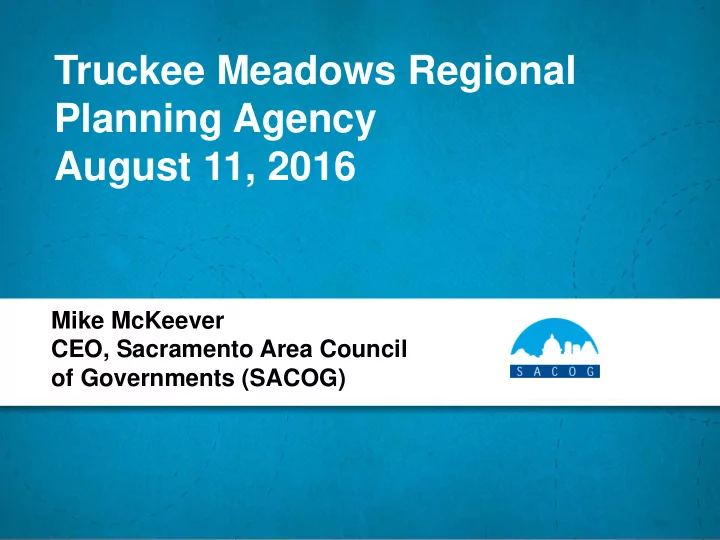

Truckee Meadows Regional Planning Agency August 11, 2016 Mike McKeever CEO, Sacramento Area Council of Governments (SACOG)
Sacramento Area Council of Governments • 6 counties • 22 cities • 2.2 million people • 31 Board members
Blueprint: Information-based planning D Regional Jurisdiction Neighborhood
Broad Public Outreach • 8,000 Participants & • Broad Representation • Across the Region • Diverse Interest Groups • Neighborhood, County and Regional Scale Workshops
1 st Regional Scenario: Base Case Future – Continue Past Trends
Need to plan both the regional and neighborhood levels
Regional Forum 2004 — 1400 people
Elected Officials Summit — Oct. 2004
Basecase 2050
Blueprint 2050
SACOG Major Planning Initiatives
Enhancing rural economic viability and environmental sustainability Rural-Urban Connections Strategy
Regional Planning: Urban and Rural
RUCS Crop Map RUCS Scenario Analysis Tool Scenario Results Modules Informing Scenarios Export Markets Water ROI Deman d Local Markets Labor Deman Truckin d g
SB375: Regional Scenario Planning with a Performance Edge Integrating transportation and land use/housing policies to reduce greenhouse gas emissions AND Advance public health, social equity, environmental sustainability, and economic growth
Set Targets
Sustainable Communities Strategy (SCS) Transportation investments + Land use patterns • An enhanced Regional Transportation Plan • Where will homes, job centers, open space, retail be located? • More opportunities to drive less through increased public transit and biking and walking options.
MTP/SCS Adopted February, 2016 • Key Issue: Phasing and right-sizing of land use and transportation projects • Land Use: – Housing (700,000 units capacity and 300,000 units demand) – Employment (1.3 million jobs capacity and 350,000 jobs demand)
Forecasting which projects will be built and when • Regulatory Factors (local, state, federal) • Policy Factors (air quality, regional plans) • Market Factors (proximity to jobs center, housing types nexus to demand, demand in subarea, adjacency to services, interest and capacity of developer, feasibility of funding needed new infrastructure)
Project Costs Benefit Measures • Travel time • Total capital costs (auto, truck, transit, bike & (amortized at annual level) ped) • Auto & truck ownership and • System reliability operating costs • Emissions • Transit operating costs • Safety • Health • Additional annual O&M costs • Maintenance and state of good repair • Land use & accessibility
SACOG CURRENT MTP: CAPACITY PROJECTS ONLY IF MATCH LAND USE • Is the roadway congested during peak demand periods, either in the base year (2012) or the planning horizon year? • Is the increase in capacity on the roadway greater than the projected increase in travel on the roadway? • Is the roadway significantly under-utilized during peak periods?
Land Use Change: 2012 to DRAFT 2036 MTP/SCS
Roadway Congestion Levels and Relative Volumes — Discussion Draft Project List Peak Period V/C Ratios <=0.90 Peak Period V/C Ratios <=0.90 Peak Period V/C Ratios from 0.91 to 1.00 Peak Period V/C Ratios from 0.91 to 1.00 Peak Period V/C Ratios from 1.01 to 1.10 Peak Period V/C Ratios from 1.01 to 1.10 Peak Period V/C Ratios > 1.10 FT Peak Period V/C Ratios > 1.10 dway Congestion Levels and Relative Volumes--Discussion Draft Project List (Licensed to Sacramento Area Co
Project Phasing: Outcomes • 196 fewer lane miles of new roads • 100 road or highway projects deferred • 60 new road or highway projects added
Development Costs Yuba County Infill Compact Low Focused Growth Density Pays For: • Off-Site streets • Sewer trunk, collection & Public Sector $500 MM $530 MM $600 MM treatment • Parks Infrastructure • Local streets • Sewer laterals Developer $700 MM $1.2 B $1.8 B • Water & Stormwater laterals, collection & detention Total $1.2 B $1.8 B $2.5 B
Annual Cost and Revenue to Yuba County Infill Focused Compact Growth Low Density Annual O&M $78 MM $85 MM $89 MM Annual Revenue $100 MM $94 MM $80 MM $22 MM $9 MM - $9 MM
Recommend
More recommend